武则天 英文简介武则天
中国唯一女帝--武则天ppt
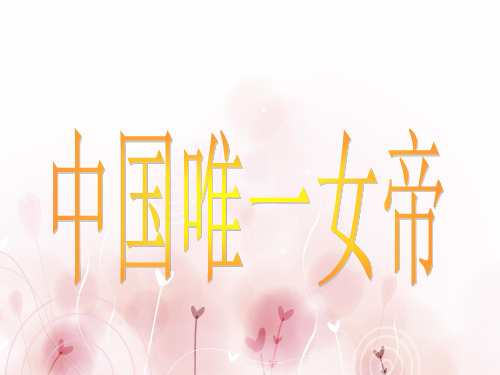
载除元年(690年),武则天废了睿宗,自称圣神皇帝,改国号为周,定都洛阳,史
称“武周”。 武则天则成为了以67岁高龄君临天下,中国历史上唯一的一位女皇帝。
武则天的功绩
高宗在位时,武则天曾建言十二件,其中有勤农桑、 薄赋税、息干戈、禁淫巧、省力役等进步的主张, 高宗皆略施行之。在武則天执政的半个世纪中,执 行了一些具有进步性的政策,所以社会经济呈现出 发展的趋势。 武则天称帝后,大开科举,破格用人;奖励农桑, 发展经济;知人善任,容人纳谏。在她掌理朝政近 半个世纪,社会稳定,经济发展,为后来“开元盛 世”打下基础。
• 中文名:武曌 • 别名:武则天、武媚 • 出生地:山西省 吕梁市 文水县 • 出生日期:公元624年2月 17日 • 入宫时间:公元638年 (武则天14岁时) • 载初元年 (公元690年) • 逝世日期:公元705年12 月16日
• 职业:大周皇帝 • 信仰:佛教 • 主要成就:废唐,改国号 为周 中国历史上唯一一个正统 的女皇帝 上承贞观之治,下启开元 盛世 • 代表作品:《臣轨》, 《如意娘》 • 生肖:猴
武则天登基之路
永淳二年(683年)高宗去世,中宗李显即位,武氏为皇太后。
嗣圣元年(684年),废李显为庐陵王,立李旦为帝。武后临朝称制,从此武则天开 始了真正独断朝纲的时代。 同年的9月,反对派在扬州汇聚了十万人马,并发动了针对武则天的叛乱,武则天派 遣三十万大军迅速平定了叛乱。同时,武则天则诛杀了她大部分的朝中反对派。 在打击反对派的同时,武则天还修造祥瑞,建明堂,并在佛经典<大云经>中找到女人 称帝的依据,为自己称帝打造言论。
武则天(624年
~705年)是中国历史
上唯一一个正统的女皇
帝,也是也是继位年龄 最大的皇帝皇帝之一(终年82岁)。
emperor wu 武则天简介
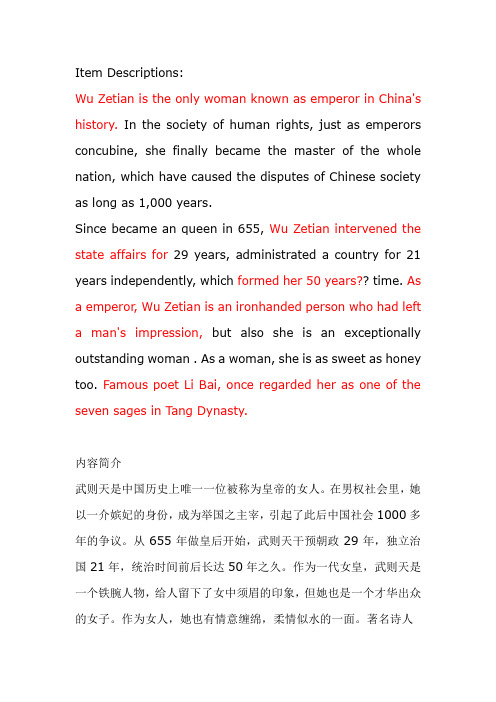
Item Descriptions:Wu Zetian is the only woman known as emperor in China's history.In the society of human rights, just as emperors concubine, she finally became the master of the whole nation, which have caused the disputes of Chinese society as long as 1,000 years.Since became an queen in 655, Wu Zetian intervened the state affairs for 29 years, administrated a country for 21 years independently, which formed her 50 years?? time. As a emperor, Wu Zetian is an ironhanded person who had left a man's impression, but also she is an exceptionally outstanding woman . As a woman, she is as sweet as honey too. Famous poet Li Bai, once regarded her as one of the seven sages in T ang Dynasty.内容简介武则天是中国历史上唯一一位被称为皇帝的女人。
在男权社会里,她以一介嫔妃的身份,成为举国之主宰,引起了此后中国社会1000多年的争议。
从655年做皇后开始,武则天干预朝政29年,独立治国21年,统治时间前后长达50年之久。
武则天 Wǔ Zétiān (624-705 AD)—中国历史人物英文介绍
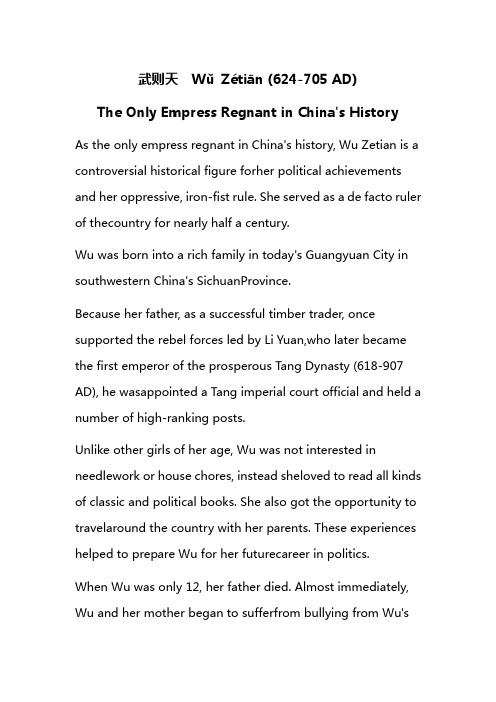
武则天WǔZétiān (624-705 AD) The Only Empress Regnant in China's History As the only empress regnant in China's history, Wu Zetian is a controversial historical figure forher political achievements and her oppressive, iron-fist rule. She served as a de facto ruler of thecountry for nearly half a century.Wu was born into a rich family in today's Guangyuan City in southwestern China's SichuanProvince.Because her father, as a successful timber trader, once supported the rebel forces led by Li Yuan,who later became the first emperor of the prosperous Tang Dynasty (618-907 AD), he wasappointed a Tang imperial court official and held a number of high-ranking posts.Unlike other girls of her age, Wu was not interested in needlework or house chores, instead sheloved to read all kinds of classic and political books. She also got the opportunity to travelaround the country with her parents. These experiences helped to prepare Wu for her futurecareer in politics.When Wu was only 12, her father died. Almost immediately, Wu and her mother began to sufferfrom bullying from Wu'suncles and other relatives and their lives became miserable. But after learning that Wu was a peerless beauty, the then Emperor T aizong summoned her to the imperial court and named her one of his concubines. That year, Wu was 13.Wu was a very bright, but extremely strong-willed person. She was also known for hercombination of sagaciousness and cunning.As a result, she never had any official titles conferred upon her by Emperor Taizong, despiteserving him for 12 years. The emperor believed that Wu was an extraordinary and ambitiouswoman, so he was always wary of her and tried hard to restrain her status and influence in theimperial court.One day, the emperor consulted an imperial astronomer about a widely spread rumor that afterthe third emperor of Tang an empress would take over the throne.The emperor asked if he should kill all the females at court he was suspicious of. The astronomersaid: "If it happens, it's Heaven's decree, man shouldn't interfere."Not long after Emperor Taizong died in 649 AD, Wu became the empress of his son, the newEmperor Gaozong.In the following years, Empress Wu began to gain more and more influence in the imperial court and she was actually making many important decisions in state affairs in the later years ofEmperor Gaozong.After Emperor Gaozong died, Wu became the Empress Dowager and she first deposed the nextnew emperor and then installed her youngest son as a puppet emperor. She herself began topreside over all important imperial court gatherings.Wu, as the de facto ruler, resorted to ruthless and oppressive means to consolidate her power.She killed almost all her opponents and recruited the cruelest officials in the country to helpmaintain social order.However, despite her bad reputation as a ruler, Wu also knew how to use talented people to helpher rule the country.She followed the advice of her aides to reduce corvee and taxes and promote agriculture and theeconomy. As a result, the country flourished under her reign and the population nearly doubled.According to the traditional Chinese order of succession, a woman could never ascend thethrone. In order to achieve her ambition of becoming the first empress regnant of the country,Wu founded her own dynasty in 690 AD. Wu's dynasty, called Zhou, lasted for 15 years until 705AD, the year Wu fell sick and died.Wu was not only a great politician, but also a renowned poet. She was also frequently cited inpoems written by great ancient Chinese poets.In modern times, Wu's stories have been adapted into numerous novels, stage plays andtelevision dramas.。
武则天 翻译
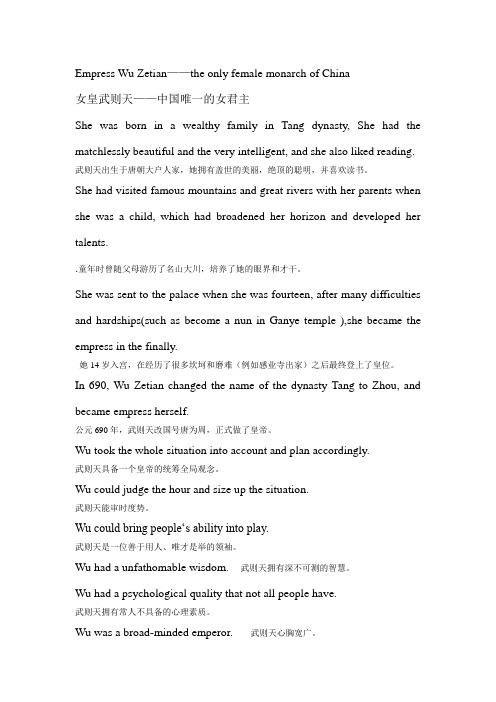
Empress Wu Zetian——the only female monarch of China女皇武则天——中国唯一的女君主She was born in a wealthy family in Tang dynasty, She had the matchlessly beautiful and the very intelligent, and she also liked reading. 武则天出生于唐朝大户人家,她拥有盖世的美丽,绝顶的聪明,并喜欢读书。
She had visited famous mountains and great rivers with her parents when she was a child, which had broadened her horizon and developed her talents..童年时曾随父母游历了名山大川,培养了她的眼界和才干。
She was sent to the palace when she was fourteen, after many difficulties and hardships(such as become a nun in Ganye temple ),she became the empress in the finally.她14岁入宫,在经历了很多坎坷和磨难(例如感业寺出家)之后最终登上了皇位。
In 690, Wu Zetian changed the name of the dynasty Tang to Zhou, and became empress herself.公元690年,武则天改国号唐为周,正式做了皇帝。
Wu took the whole situation into account and plan accordingly.武则天具备一个皇帝的统筹全局观念。
Wu could judge the hour and size up the situation.武则天能审时度势。
唐朝武则天英文介绍作文
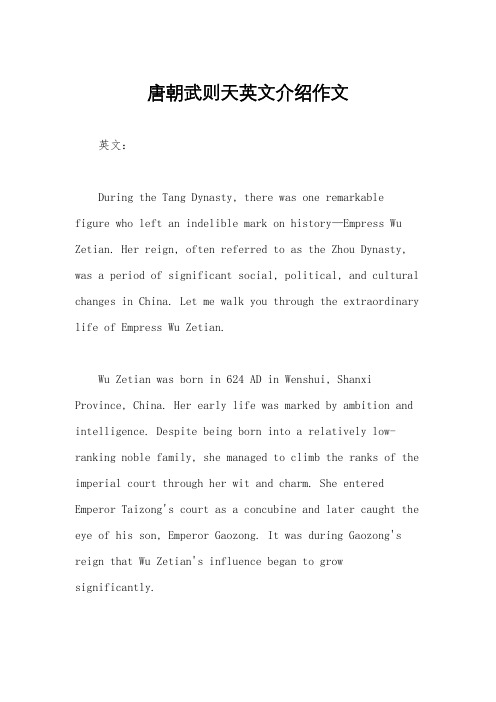
唐朝武则天英文介绍作文英文:During the Tang Dynasty, there was one remarkablefigure who left an indelible mark on history—Empress Wu Zetian. Her reign, often referred to as the Zhou Dynasty, was a period of significant social, political, and cultural changes in China. Let me walk you through the extraordinary life of Empress Wu Zetian.Wu Zetian was born in 624 AD in Wenshui, Shanxi Province, China. Her early life was marked by ambition and intelligence. Despite being born into a relatively low-ranking noble family, she managed to climb the ranks of the imperial court through her wit and charm. She entered Emperor Taizong's court as a concubine and later caught the eye of his son, Emperor Gaozong. It was during Gaozong's reign that Wu Zetian's influence began to grow significantly.Wu Zetian was not only politically astute but also highly educated. She encouraged the advancement of education and literature during her rule, leading to a flourishing of the arts and sciences. Under her patronage, many scholars and poets thrived, contributing to what is now known as the "Golden Age of Chinese Poetry."Moreover, Wu Zetian was a trailblazer for women'srights in ancient China. She implemented policies to improve the status of women in society, such as opening up government positions to women and advocating for theirright to education. Her efforts paved the way for future generations of women to participate more actively in public life.However, Empress Wu Zetian's reign was not without controversy. She was known for her ruthlessness in dealing with political opponents, and there were rumors of her involvement in various conspiracies and murders. Despite these allegations, she managed to maintain power and stability throughout her rule.In conclusion, Empress Wu Zetian was a complex and influential figure in Chinese history. Her legacy is a testament to her political acumen, cultural patronage, and advocacy for women's rights. Though she remains a controversial figure, there is no denying the lastingimpact she had on the Tang Dynasty and beyond.中文:唐朝时期,有一位非凡的人物留下了历史上不可磨灭的印记——武则天皇帝。
武则天简介-中英文对照

今天我要介绍的是中国历史上空前绝后的唯一一位女皇帝—武则天,她创造了中国历史的奇迹。
Today I want to introduce the only female emperor in China’s history ---- Wu Zetian,who created the miracle of Chinese history。
她是中国历史上杰出的政治家、军事家,同时也是一位诗人。
She was an outstanding politician,strategist as well as a poet in Chinese history.武则天出生于唐朝大户人家,她拥有盖世的美丽,绝顶的聪明,并喜欢读书。
she was born in a wealthy family in Tang dynasty,She had thematchlessly beautiful and the very intelligent, and she also liked reading.童年时曾随父母游历了名山大川,培养了她的眼界和才干,所有的这些为以后称帝奠定了基础。
she had visited famous mountains and great rivers with her parents when she was a child, which had broadened her horizon and developed her talents, and all of these had laid the foundation for becoming the empress in the future.•她14岁入宫,在经历了很多坎坷和磨难(例如感业寺出家)之后最终登上了皇位。
She was sent to the palace when she was fourteen, after many difficulties and hardships(such as become a nun in Ganye temple ),she became the empress in the finally. 公元690年,武则天改国号唐为周,正式做了皇帝。
武则天英文简介

Empress Wu ZetianWu Zetian was born of a royal lineage during the Tang Dynasty. She entered Emperor Taizong's harem when she was 13 and that of the successive emperor Gaozong after. A master of manipulation, Wu Zetian persuaded the emperor to declare her one rank below the empress consort. Eventually, the Emperor married Wu. When Gaozong suffered a stroke five years later, Wu governed behind the scenes. She created a secret police force to spy on her opposition, jailing or killing those who stood in her way.After Gaozong's death she reigned through puppet emperors, her sons Zhongzong and Ruizong. She finally proclaimed herself Emperor, the first woman to do so. Wu ruled until her 80s when she was unable to thwart a coup. She died shortly after. Despite her ruthless climb to power, her rule was benign. Wu reduced the size of the standing army, and replaced aristocrats in the government with scholars. She was fair to the peasantry, lowering taxes, raising agricultural production, and strengthening public works. Wu also campaigned to elevate the status of women and had scholars write biographies of famous women.今天我要介绍的是中国历史上空前绝后的唯一一位女皇帝—武则天,她创造了中国历史的奇迹。
武则天英语介绍作文小学
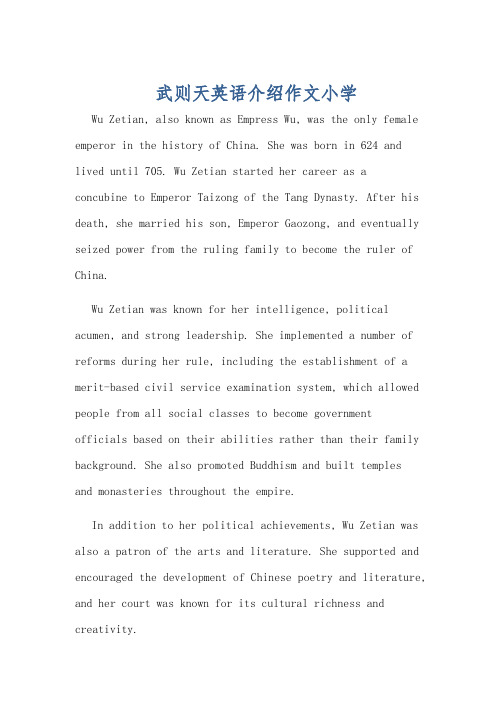
武则天英语介绍作文小学Wu Zetian, also known as Empress Wu, was the only female emperor in the history of China. She was born in 624 and lived until 705. Wu Zetian started her career as a concubine to Emperor Taizong of the Tang Dynasty. After his death, she married his son, Emperor Gaozong, and eventually seized power from the ruling family to become the ruler of China.Wu Zetian was known for her intelligence, political acumen, and strong leadership. She implemented a number of reforms during her rule, including the establishment of a merit-based civil service examination system, which allowed people from all social classes to become governmentofficials based on their abilities rather than their family background. She also promoted Buddhism and built templesand monasteries throughout the empire.In addition to her political achievements, Wu Zetian was also a patron of the arts and literature. She supported and encouraged the development of Chinese poetry and literature, and her court was known for its cultural richness and creativity.Despite her many accomplishments, Wu Zetian's rule was also marked by controversy and political intrigue. She was known for her ruthlessness in dealing with her enemies, and her reign was characterized by a series of power struggles and purges.After her death, Wu Zetian was buried in a grand mausoleum near Xi'an, the capital of the Tang Dynasty. Her legacy continues to be a subject of debate among historians, with some viewing her as a capable and visionary leader, while others criticize her for her authoritarian rule and the brutal means by which she maintained power.武则天,又称武曌,是中国历史上唯一的女皇帝。
武则天简介英文介绍
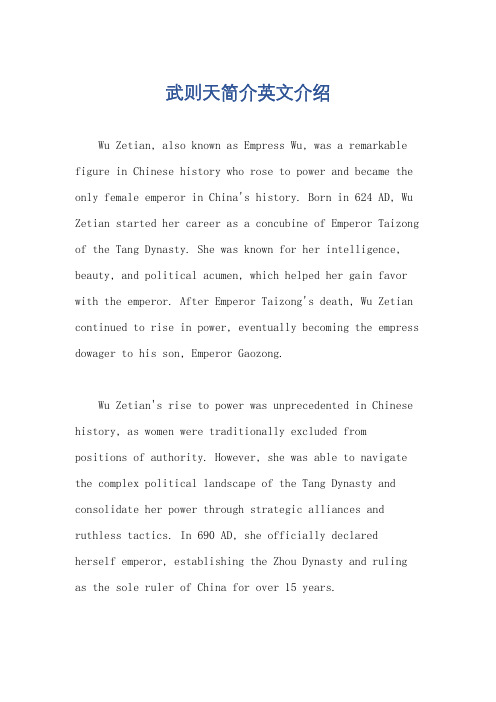
武则天简介英文介绍Wu Zetian, also known as Empress Wu, was a remarkable figure in Chinese history who rose to power and became the only female emperor in China's history. Born in 624 AD, Wu Zetian started her career as a concubine of Emperor Taizong of the Tang Dynasty. She was known for her intelligence, beauty, and political acumen, which helped her gain favor with the emperor. After Emperor Taizong's death, Wu Zetian continued to rise in power, eventually becoming the empress dowager to his son, Emperor Gaozong.Wu Zetian's rise to power was unprecedented in Chinese history, as women were traditionally excluded frompositions of authority. However, she was able to navigate the complex political landscape of the Tang Dynasty and consolidate her power through strategic alliances and ruthless tactics. In 690 AD, she officially declaredherself emperor, establishing the Zhou Dynasty and ruling as the sole ruler of China for over 15 years.During her reign, Wu Zetian implemented a series of reforms aimed at strengthening central authority and promoting social welfare. She expanded the civil service examination system, which allowed for greater social mobility and merit-based appointments. Wu Zetian also promoted Buddhism and sponsored the construction of numerous temples and monasteries, earning her the support of the Buddhist clergy.Despite her accomplishments, Wu Zetian's reign was not without controversy. She was known for her authoritarian rule and ruthless suppression of dissent, leading to accusations of tyranny and cruelty. Her consolidation of power also led to tensions within the imperial court and among the ruling elite. In 705 AD, a coup led by her son Li Xian resulted in her removal from power and the restoration of the Tang Dynasty.Wu Zetian's legacy remains a subject of debate among historians and scholars. Some view her as a trailblazer who shattered gender barriers and brought stability to a fractured empire, while others criticize her for herruthless tactics and authoritarian rule. Regardless of differing opinions, Wu Zetian's reign as China's only female emperor left a lasting impact on Chinese history and continues to be a source of fascination and intrigue.。
关于武则天的英语作文
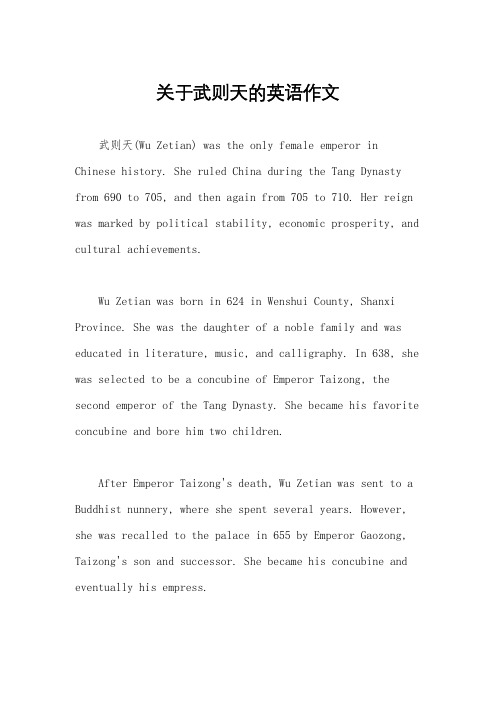
关于武则天的英语作文武则天(Wu Zetian) was the only female emperor in Chinese history. She ruled China during the Tang Dynasty from 690 to 705, and then again from 705 to 710. Her reign was marked by political stability, economic prosperity, and cultural achievements.Wu Zetian was born in 624 in Wenshui County, Shanxi Province. She was the daughter of a noble family and was educated in literature, music, and calligraphy. In 638, she was selected to be a concubine of Emperor Taizong, the second emperor of the Tang Dynasty. She became his favorite concubine and bore him two children.After Emperor Taizong's death, Wu Zetian was sent to a Buddhist nunnery, where she spent several years. However, she was recalled to the palace in 655 by Emperor Gaozong, Taizong's son and successor. She became his concubine and eventually his empress.Wu Zetian was a shrewd and ambitious woman who was not content to be just a consort. She was involved in politics and often gave advice to the emperor. She also had a network of loyal supporters who helped her gain power and influence.In 690, Emperor Gaozong became seriously ill, and Wu Zetian seized the opportunity to take control of the government. She declared herself emperor, the first and only woman to do so in Chinese history. She ruled China for the next 15 years, during which time she implemented many reforms and policies that strengthened the Tang Dynasty.Wu Zetian's reign was marked by political stability and economic prosperity. She reformed the tax system, built new roads and canals, and encouraged trade and commerce. She also promoted education and the arts, and many great works of literature and art were produced during her reign.However, Wu Zetian's rule was also marked by controversy and violence. She was known for her ruthlessness and was accused of killing her rivals andopponents. She also had a network of spies and informants who helped her maintain her power.In 705, Wu Zetian was forced to abdicate by her son, Emperor Zhongzong. However, she regained power a few months later when she had him deposed and replaced with his brother, Emperor Ruizong. She ruled as regent until 710, when she was forced to abdicate again, this time in favor of Emperor Zhongzong's daughter, Princess Taiping.Wu Zetian died in 705 at the age of 81. She left behind a legacy as a powerful and controversial ruler who helped to shape Chinese history. Her reign was marked by both achievements and controversies, and she remains a fascinating figure in Chinese history to this day.。
一代女皇武则天

永徽二年(651年)八月,武则天再次回到自己生活过的唐朝皇 官。这是她与唐高宗李治的共同要求,同时还有着另一层复 杂的背景,这就是王皇后在宫中受到萧淑妃争宠的困扰,迫 切希望借武则天回宫来离间皇帝对萧淑妃的宠爱之情。武则 天回宫之初,也只是宫女身份,安排王皇后身边。武则天出 于政治上的要求,聪明乖巧,“卑词曲体以事后”,王皇后 “数称其美于上”。永徽三年(652年),武则天生了长子李弘, 给自己带来了晋升的希望,也给王皇后增加了一层忧虑。本 来武则天就与唐高宗志趣相投,皇帝对她的恩宠日益增多, 使王皇后大为吃醋。永徽五年(654年)三月,武则天被册封为 昭仪,地位仅次于皇后与淑纪,成为后宫的第三号人物。 永徽六年(655年)六月,王皇后密于母柳氏求巫祝厌胜(即请巫 师作法咒诅他人),事发,唐高宗大怒,断令柳氏不得人宫, 舅柳(特殊字)罢知政事。十月十三日,唐高宗下诏:“王皇后 萧淑妃谋行鸠毒,废为庶人。母及兄弟一并除名流放岭南。 亡父王仁佑追夺告身。”连贬出京城的柳(特殊字)也因潜通宫 掖,谋行鸠毒处以死罪。 永徽六年(655年)十月十九日,唐高 宗下诏立武则天为皇后。登上皇后宝座,是武则天一生成败 的关键环节,她的政治生涯也由此开始了。
则
天
封
后
武则天工于心计,心狠手辣,兼涉文 史,富有才气。27岁才产下长女,据 《资治通鉴》记载:武则天的长女出 生后才一月之际,王皇后来看过她的 女儿之后,她就亲手把女儿给杀死了, 皇帝一气之下把皇后打入冷宫,后来 被武则天暗中杀死。书里的原话是 “送到日本”。高宗大怒,于是起了 废后的念头。
则 天 封 后 当时朝廷以长孙无忌、褚遂良为首的元老大臣势力强大,唐高宗的权
武 则 天 画 像
武则天初入宫廷
武氏为唐都督武士彠次女。武士 彠掌握数州的军政大权但他终究 只是山西平民出生的木材商,只 是 靠战乱平步青云。所以,骆宾 王在《讨武氏檄》中说武媚娘 “地 实寒微”。母亲杨氏,本名不详。 据说武则天祖籍山西文水,在四 川利州(今广元)度过她的童年 和少年时期,12岁父亲去世,她 和母亲受到族兄的虐待。贞观十一年(637年),14 岁的武则天入宫成为唐太宗的才人(正五品),唐太 宗最初非常宠爱她,赐名“武媚娘”,但不久便将她冷 落一边。武则天做了12年的才人,地位始终没有得到 提升,在唐太宗病重期间,武则天和唐太宗的儿子后 来的高宗李治建立了感情。
中国唯一一个女皇帝武则天简介
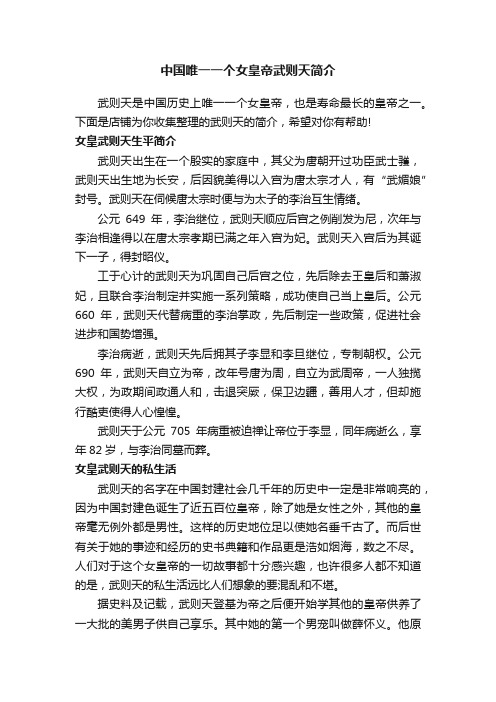
中国唯一一个女皇帝武则天简介武则天是中国历史上唯一一个女皇帝,也是寿命最长的皇帝之一。
下面是店铺为你收集整理的武则天的简介,希望对你有帮助!女皇武则天生平简介武则天出生在一个殷实的家庭中,其父为唐朝开过功臣武士彟,武则天出生地为长安,后因貌美得以入宫为唐太宗才人,有“武媚娘”封号。
武则天在伺候唐太宗时便与为太子的李治互生情绪。
公元649年,李治继位,武则天顺应后宫之例削发为尼,次年与李治相逢得以在唐太宗孝期已满之年入宫为妃。
武则天入宫后为其诞下一子,得封昭仪。
工于心计的武则天为巩固自己后宫之位,先后除去王皇后和萧淑妃,且联合李治制定并实施一系列策略,成功使自己当上皇后。
公元660年,武则天代替病重的李治掌政,先后制定一些政策,促进社会进步和国势增强。
李治病逝,武则天先后拥其子李显和李旦继位,专制朝权。
公元690年,武则天自立为帝,改年号唐为周,自立为武周帝,一人独揽大权,为政期间政通人和,击退突厥,保卫边疆,善用人才,但却施行酷吏使得人心惶惶。
武则天于公元705年病重被迫禅让帝位于李显,同年病逝么,享年82岁,与李治同墓而葬。
女皇武则天的私生活武则天的名字在中国封建社会几千年的历史中一定是非常响亮的,因为中国封建色诞生了近五百位皇帝,除了她是女性之外,其他的皇帝毫无例外都是男性。
这样的历史地位足以使她名垂千古了。
而后世有关于她的事迹和经历的史书典籍和作品更是浩如烟海,数之不尽。
人们对于这个女皇帝的一切故事都十分感兴趣,也许很多人都不知道的是,武则天的私生活远比人们想象的要混乱和不堪。
据史料及记载,武则天登基为帝之后便开始学其他的皇帝供养了一大批的美男子供自己享乐。
其中她的第一个男宠叫做薛怀义。
他原名叫冯小宝,在没有成为武则天的男宠之前是一个在市井上卖药的普通人。
但是他身材魁梧,长相柔美,又能说会道,而此时的武则天因为太宗皇帝死后非常悲痛,正在当时的白马寺过着孤寂的尼姑生活。
这时冯小宝出现了,他和武则天一来二往就熟悉了,武则天对他可谓是用情至深,即使后来回到皇宫之后依然对冯小宝念念不忘,时常偷偷溜出皇宫与他相会。
武则天的英文介绍(Empress Wu Zetian in Dang Dynasty)

中华女皇帝武则天Empress Wu Zetian in Dang DynastyEmpress Wu was the only female monarch of China, and remains the mostremarkable, influential and mysterious woman in Chinese history.Contrary to the teachings of Confucius, this was a woman who ruled theempire for over half a century; while her actions have been a subject for debate formore ten centuries. Opinion is sharply divided between those who admire her for hermany achievements and those who regard her as a ruthless, merciless schemer andautocrat. Others will say merely that she did what she had to do and that her actions were no different from those of male emperors.AchievementsIn spite of her ruthless rise to power, Wu proved to be a very competent monarch and throughout her reign the legacy of prosperity bequeathed by the late Taizong.The Empress was eager to draw into her government all manner of talented people. In the first year of her period of absolute power, she sent officials far and wide to search for people of outstanding ability. Wu Zetian even encouraged people to volunteer their services should they consider themselves of value to her. In this way no effort was spared to recruit able persons into the civil service. The imperial examination system was further revised in order that no man of ability should be excluded due to his lowly birth. She also initiated the practice of personally interviewing candidates. These formalities guaranteed appointments could no longer be obtained through patronage, bribery or corruption.Surprisingly, she showed tolerance towards her critics. Ever willing to listen to new ideas and suggestions, she generously rewarded those who offered sound advice and demonstrated enterprise. This ensured that throughout her long reign, she always had the support of a loyal administration.Wu Zetian attached great importance to the development of agriculture. She ordered the construction of irrigation schemes. So as to create a bank of knowledge about agricultural matters and develop expertise, she commissioned the compilation of farming textbooks. Local officials were charged with the task of bringing more land under cultivation. As an incentive for increased production, taxes were reduced and the imposition upon the peasant population was eased. By allowing peasant farmers to retain more of their produce, they were able to improve their living standard and in general the population benefited from quite considerable prosperity.The relationships that had been established between the empire and the neighboring Tubo deteriorated. A series of many border skirmishes led to a final defeat of the Tubo in 692. Afterwards, steps were taken to keep the vast lands to the north and south of the Tainshan Mountains secure from invasion. The Anxi Military Viceroy and the Beiting Military Viceroy were given responsibility for the area, with the consequence that Wu’s defence policy effectively consolidated the north-western border region.Wu’s religious policy gave Buddhism precedence over Taoism as the favoured state rel igion. She encouraged gifted scholars to settle in China and many Buddhist temples were built. Also, many of the finest Buddhist cave sculptures were created. Under the patronage of the Empress, Buddhism made its greatest advances within China.Wu Zetian poured scorn on the Confucian belief that women should always be subordinate to men. As well as furthering her own ambitions, she sought to enhance the position of women in society. This included employing scholars to write biographies of famous women. These works served as a reminder to everyone that women were every bit as capable ofmen. All they lacked was equal opportunity.The DownsideIt is said there is good and bad in everybody. So far as Wu Zetian was concerned, when she was bad she could be very bad indeed. To achieve her ambitions she was as ruthless as possible. She did not hesitate to arrange the murders of members of her family, her husband’s concubines or ministers if they opposed her. Even Wu’s infant daughter was sacrificed in order that she might succeed in her desire for power. The men whose loyalty to both Li Yuan and Li Shimin had helped establish the Tang Dynasty were subjected to her cruelty. These included Zhangsun Wuji, Chu Suiliang, Yu Zhining and Cheng Wuting and many others who were either put to death or reduced in rank. Members of the Li royal family and their relatives were likewise eliminated.Once she was on the throne, Wu was ever cautious lest any of her ministers proved to be disloyal or plot against her. She appointed sadistic and cruel officials to seek out and eliminate any opposition to her regime. Men such as Suo Yuanli, Zhong Xing and Lai Juncheng became famous due to their methods of exposing so-called enemies of their mistress. In such times, it is possible to be rid of rivals by denouncing them as conspirators or laying trumped up charges against them. So, although those who opposed Wu were severely dealt with, also many other innocent people were cruelly put to death. However, once Wu Zetian was satisfied that her regime was secure, she did relax some of her repressive measures and there were far fewer executions.In her later life, and probably to ease her conscience, Wu Zetian resorted to Buddhism for solace. Her enthusiasm for building temples and monuments placed a huge strain on resources and labour. This show of religious fervour could not hide her continued craving for greatness and acclaim as she enjoyed an extravagant lifestyle. In particular, her penchant for her male concubines contributed to her reputation for decadence!Retirement from Center StageAs Wu grew older, so her hold on state affairs began to lessen. She also realised that as a woman, she could only be respected after her death as a member of the Li family. She therefore allowed herself to be persuaded in 698 to reinstate Li Xian as Crown Prince.Aged eighty-two, Wu Zetian died in the December of the year in which she had been deposed. She was buried alongside Emperor Gaozong in the Qingling Tomb, located west of the present day Xian City. At her own wish, her final resting place was marked by a plain tombstone lacking any inscription. To some, this symbolises her absolute power that no words could describe. To others the absence of any comment suggests that she wanted future generations to decide for themselves how she should be eulogized.So lived and died the only woman who ever ruled the Chinese empire in her own right. According to Confucius, having a female monarch is unnatural as ‘a hen crowing like a rooster at daybreak.’ However, for what proved to be one of the most glorious periods during the Tang Dynasty, a woman did rule the empire. What is more, she did so with more than fair measure of success. Down the ages, many have described Wu as a ruthless, cruel and despotic autocrat. Others, with rather more pragmatic views, have said she merely behaved as many men in her position had done, both before and since her notorious reign.。
一武则天简介
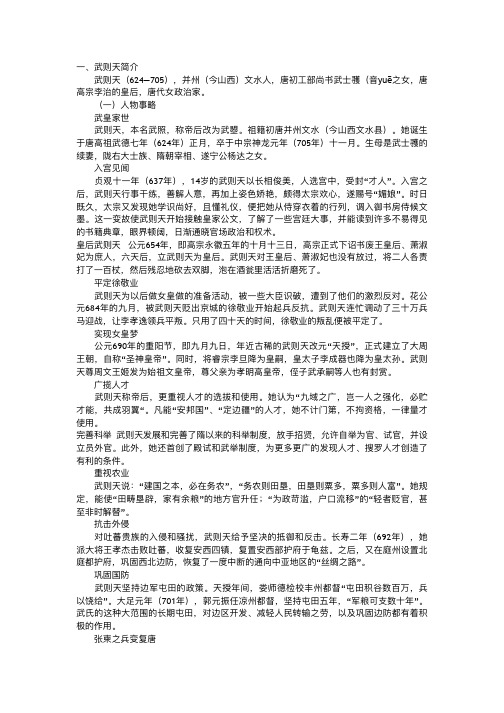
⼀一、武则天简介 武则天(624—705),并州(今⼭山⻄西)⽂文⽔水⼈人,唐初⼯工部尚书武⼠士彟(⾳音yuē之⼥女女,唐⾼高宗李李治的皇后,唐代⼥女女政治家。
(⼀一)⼈人物事略略 武皇家世 武则天,本名武照,称帝后改为武曌。
祖籍初唐并州⽂文⽔水(今⼭山⻄西⽂文⽔水县)。
她诞⽣生于唐⾼高祖武德七年年(624年年)正⽉月,卒于中宗神⻰龙元年年(705年年)⼗十⼀一⽉月。
⽣生⺟母是武⼠士彟的续妻,陇右⼤大⼠士族、隋朝宰相、遂宁公杨达之⼥女女。
⼊入宫⻅见闻 贞观⼗十⼀一年年(637年年),14岁的武则天以⻓长相俊美,⼈人选宫中,受封“才⼈人”。
⼊入宫之后,武则天⾏行行事⼲干练,善解⼈人意,再加上姿⾊色娇艳,颇得太宗欢⼼心,遂赐号“媚娘”。
时⽇日既久,太宗⼜又发现她学识尚好,且懂礼仪,便便把她从侍穿⾐衣着的⾏行行列列,调⼊入御书房侍候⽂文墨墨。
这⼀一变故使武则天开始接触皇家公⽂文,了了解了了⼀一些宫廷⼤大事,并能读到许多不不易易得⻅见的书籍典章,眼界顿阔,⽇日渐通晓官场政治和权术。
皇后武则天公元654年年,即⾼高宗永徽五年年的⼗十⽉月⼗十三⽇日,⾼高宗正式下诏书废王皇后、萧淑妃为庶⼈人,六天后,⽴立武则天为皇后。
武则天对王皇后、萧淑妃也没有放过,将⼆二⼈人各责打了了⼀一百杖,然后残忍地砍去双脚,泡在酒瓮⾥里里活活折磨死了了。
平定徐敬业 武则天为以后做⼥女女皇做的准备活动,被⼀一些⼤大⾂臣识破,遭到了了他们的激烈烈反对。
花公元684年年的九⽉月,被武则天贬出京城的徐敬业开始起兵反抗。
武则天连忙调动了了三⼗十万兵⻢马迎战,让李李孝逸领兵平叛。
只⽤用了了四⼗十天的时间,徐敬业的叛乱便便被平定了了。
实现⼥女女皇梦 公元690年年的重阳节,即九⽉月九⽇日,年年近古稀的武则天改元“天授”,正式建⽴立了了⼤大周王朝,⾃自称“圣神皇帝”。
同时,将睿宗李李旦降为皇嗣,皇太⼦子李李成器器也降为皇太孙。
武则天尊周⽂文王姬发为始祖⽂文皇帝,尊⽗父亲为孝明⾼高皇帝,侄⼦子武承嗣等⼈人也有封赏。
史上最荒淫十大女色狼:武则天只能排最后

史上最荒淫十大女色狼:武则天只能排最后一提起色狼两个字,人们想到最多的可能就是男人们对于美丽女人的非分之举。
在中国古代,色狼们可真不少,有名的例如西门庆。
其实,在历史上女色狼也有不少,完全不输给男色狼们,她们个个美艳无比、心机重重,而色诱的背后所隐藏的也许是政治野心、也许是富贵权势、也许也只是肉体之欢。
NO.10 武则天武则天是中国历史记载的唯一一位女皇帝,是唐太宗李世民的才人,唐高宗李治的皇后。
武则天武则天既是一位杰出的政治家,也是一个心狠手辣的女人。
她历经磨难,苦心孤诣的参与朝政,最后终于登上帝位。
但是,晚年的武则天在内廷之内荒淫无度,广招天下男宠。
历史记载较为有名的武则天的面首(男宠)有薛怀义、张易之、张昌宗、沈南等,他们都是相貌英俊、体格健壮的男人,能够满足武则天的荒淫欲望。
NO.9 上官婉儿上官婉儿是唐高宗时宰相上官仪孙女,祖父被杀,上官婉儿被配没掖廷。
她聪敏异常,后武则天让其掌管宫中诏命,参决政务,权势日盛。
上官婉儿705年,唐中宗复位,拜上官婉儿为昭容。
上官婉儿与武三思成婚,私生活复杂,并先后与唐中宗、韦后、安乐公主、太平公主等不同的利益集团相结合,其权势所至,甚至酿成多次宫廷政变,左右皇帝的废立。
710年,在韦后与安乐公主的弑君政变之后,上官婉儿亦被诛。
NO.8 齐文姜齐文姜是春秋时代齐僖公的次女,与她的姐姐齐宣姜,同为绝色美人。
文姜的婚姻则一波三折,与其兄乱伦,轰动了天下各国。
齐文姜后来,她一心一意地帮儿子鲁庄公处理国政,因为处置得宜,使得鲁国威望提高了不少,还在长勺挫败了霸主齐桓公的进攻。
人们一面讽刺她的荡妇淫娃行径,一面又一再歌颂她的绝世艳丽,《诗经》上就留下了许多有关文姜的篇章。
NO.7 贾南风贾南风是西晋惠帝司马衷之妻,又称惠贾皇后。
其父是西晋的开国元勋贾充。
其貌不扬,生性残酷,曾亲手杀过人。
贾南风贾南风善于钻营,精于权术,性多妒忌,并生性淫荡,秽乱春宫。
惠帝黯弱无能,国家政事,皆由贾南风干预。
武则天简介(精编版)

武则天简介武则天,中国历史上唯一一个正统的女皇帝。
以下是给大家整理武则天简介的内容,欢迎查看!中文名:武曌(武瞾、武照)别名:武则天、武媚娘国籍:中国民族:汉族出生地:四川广元出生日期:公元624年2月17日(甲申年)逝世日期:神龙元年(公元705年12月16日)职业:皇帝、政治家、诗人信仰:佛教主要成就:废唐,改国号为周;中国历史上唯一一个正统的女皇帝;上承贞观之治,下启开元盛世代表作品:《臣轨》《如意娘》谥号:则天大圣皇帝、则天大圣皇后年号:证圣圣历神功久视神功神龙享年:82岁在位时间:690年―705年陵寝:乾陵生平简介:武则天(624年-705年),并州文水(今山西文水县东)人。
中国历史上唯一一个正统的女皇帝,也是即位年龄最大(67岁即位)、寿命最长的皇帝之一(终年82岁)。
为唐朝功臣武士彟次女,母亲杨氏。
十四岁入后宫为唐太宗的才人,唐太宗赐号媚娘,唐高宗时初为昭仪,后为皇后,尊号为天后,与唐高宗李治并称二圣,683年12月27日-690年10月16日作为唐中宗、唐睿宗的皇太后临朝称制,后自立为皇帝,定洛阳为都,改称神都,建立武周王朝,神龙元年(705年)正月,武则天病笃,宰相张柬之发动兵变,迫使武氏退位,史称神龙革命。
唐中宗复辟,恢复唐朝,上尊号则天大圣皇帝,后遵武氏遗命改称则天大圣皇后,以皇后身份入葬乾陵,唐玄宗开元四年(716年),改谥号为则天皇后,天宝八载(749年),加谥则天顺圣皇后。
武则天上位:贞观十一年(637年),14岁的武则天在长安入宫成为唐太宗的才人(正五品),唐太宗最初非常宠爱她,赐名武媚,但不久便将她冷落一边。
武则天做了12年的才人,地位始终没有得到提升,在唐太宗病重期间,武则天和唐太宗的儿子后来的高宗李治建立了感情。
贞观二十三年(649年)唐太宗死后,武则天和部分没有子女的嫔妃们一起入长安感业寺为尼,但是她与新皇帝唐高宗李治一直藕断丝连。
唐高宗即位后,他的妃子萧淑妃专宠,永徽二年,皇后复召武则天入宫,企图以毒攻毒,这年武则天26岁。
武则天英语介绍作文80词
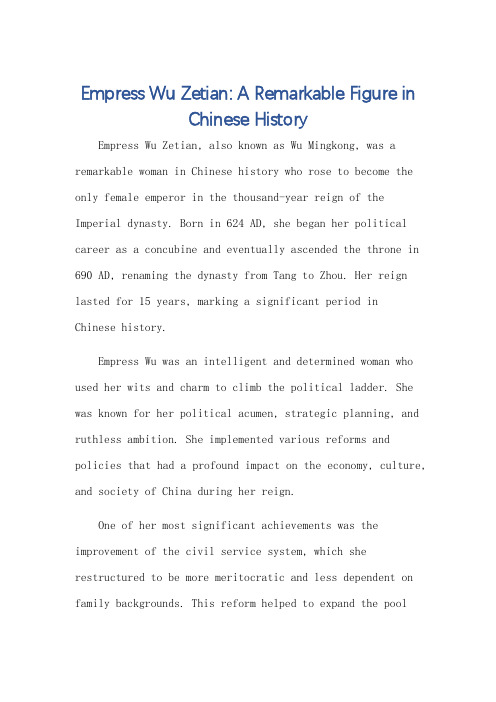
Empress Wu Zetian: A Remarkable Figure inChinese HistoryEmpress Wu Zetian, also known as Wu Mingkong, was a remarkable woman in Chinese history who rose to become the only female emperor in the thousand-year reign of the Imperial dynasty. Born in 624 AD, she began her political career as a concubine and eventually ascended the throne in 690 AD, renaming the dynasty from Tang to Zhou. Her reign lasted for 15 years, marking a significant period in Chinese history.Empress Wu was an intelligent and determined woman who used her wits and charm to climb the political ladder. She was known for her political acumen, strategic planning, and ruthless ambition. She implemented various reforms and policies that had a profound impact on the economy, culture, and society of China during her reign.One of her most significant achievements was the improvement of the civil service system, which she restructured to be more meritocratic and less dependent on family backgrounds. This reform helped to expand the poolof talented officials and enhance the efficiency of the government.Empress Wu also promoted the development of literature, art, and science during her reign. She patronized scholars and artists and established institutions to promotecultural and intellectual pursuits. Her support for literature and poetry led to a flourishing of cultural activities and the emergence of several notable literary figures.Despite her remarkable achievements, Empress Wu's reign was not without controversy. She was accused of being cruel and autocratic, and her policies were sometimes controversial and divisive. Her legacy has been debated and interpreted differently by historians, but her impact on Chinese history remains undeniable.In conclusion, Empress Wu Zetian was a remarkablefigure in Chinese history who left a lasting impact on the country's political, economic, and cultural development. Her life and reign serve as a testament to the resilience and adaptability of Chinese women in history and their ability to shape the course of national events.**武则天:中国历史上的杰出女性**武则天,又名武曌,是中国历史上一位杰出的女性,她成为了千年帝制中唯一的女皇帝。
武则天英文简介
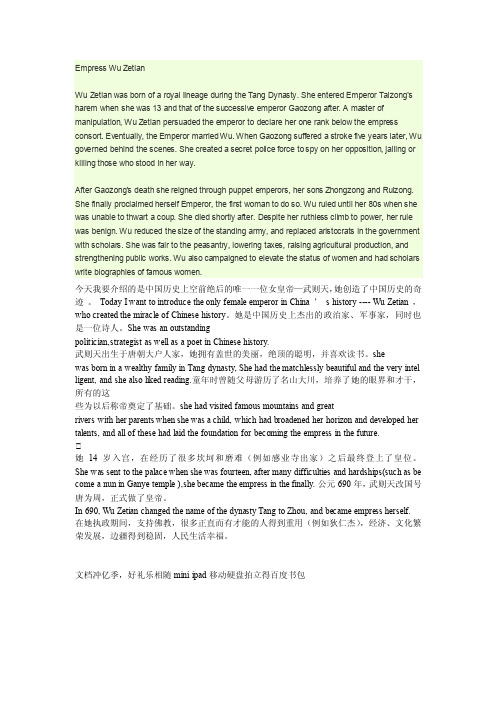
Empress Wu ZetianWu Zetian was born of a royal lineage during the Tang Dynasty. She entered Emperor Taizong's harem when she was 13 and that of the successive emperor Gaozong after. A master of manipulation, Wu Zetian persuaded the emperor to declare her one rank below the empress consort. Eventually, the Emperor married Wu. When Gaozong suffered a stroke five years later, Wu governed behind the scenes. She created a secret police force to spy on her opposition, jailing or killing those who stood in her way.After Gaozong's death she reigned through puppet emperors, her sons Zhongzong and Ruizong. She finally proclaimed herself Emperor, the first woman to do so. Wu ruled until her 80s when she was unable to thwart a coup. She died shortly after. Despite her ruthless climb to power, her rule was benign. Wu reduced the size of the standing army, and replaced aristocrats in the government with scholars. She was fair to the peasantry, lowering taxes, raising agricultural production, and strengthening public works. Wu also campaigned to elevate the status of women and had scholars write biographies of famous women.今天我要介绍的是中国历史上空前绝后的唯一一位女皇帝—武则天,她创造了中国历史的奇迹。
武则天的英文介绍作文
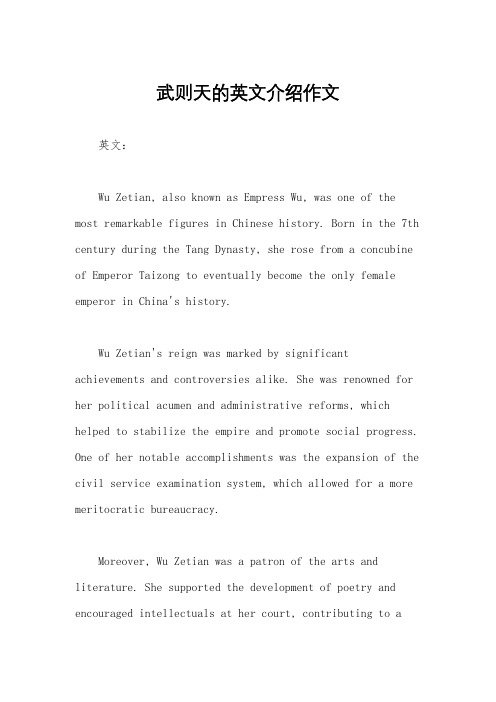
武则天的英文介绍作文英文:Wu Zetian, also known as Empress Wu, was one of the most remarkable figures in Chinese history. Born in the 7th century during the Tang Dynasty, she rose from a concubine of Emperor Taizong to eventually become the only female emperor in China's history.Wu Zetian's reign was marked by significant achievements and controversies alike. She was renowned for her political acumen and administrative reforms, which helped to stabilize the empire and promote social progress. One of her notable accomplishments was the expansion of the civil service examination system, which allowed for a more meritocratic bureaucracy.Moreover, Wu Zetian was a patron of the arts and literature. She supported the development of poetry and encouraged intellectuals at her court, contributing to aflourishing cultural renaissance during her rule.However, Wu Zetian's reign was not without its controversies. Her rise to power involved politicalintrigue and ruthlessness, leading to the removal and sometimes even execution of rivals and opponents. Her methods earned her both admiration and criticism throughout history.In addition to her political prowess, Wu Zetian is also remembered for her personal life. She was known for her intelligence and charisma, as well as her relationshipswith various consorts and advisors. Her ability to navigate the complexities of court politics while maintainingcontrol over her empire is a testament to her strength and cunning.Overall, Wu Zetian's legacy is complex and multifaceted. She is remembered as a skilled ruler who left a lasting impact on Chinese history, for better or for worse.中文:武则天,又称武后,是中国历史上最杰出的人物之一。
